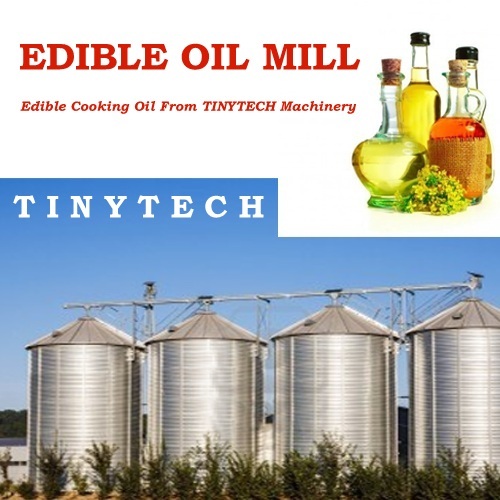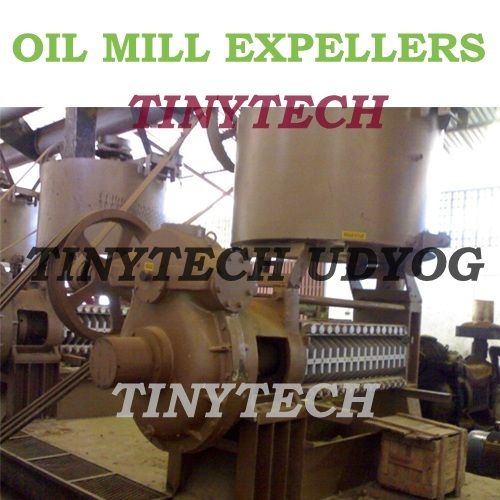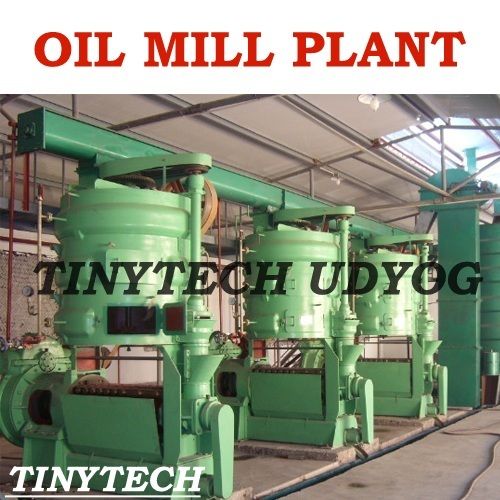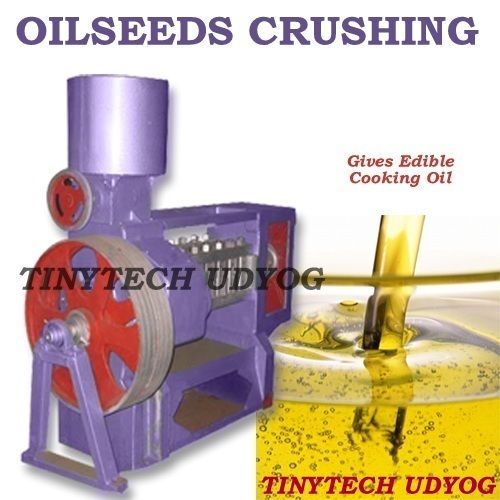
Edible Oil Mill

Product Details:
- Product Type Oil Mill Plant
- Capacity 130 Kg/hr
400000.00 - 500000.00 INR/Plant
X
Edible Oil Mill Price And Quantity
- 400000.00 - 500000.00 INR/Plant
- 1 Plant
Edible Oil Mill Product Specifications
- Oil Mill Plant
- 130 Kg/hr
Edible Oil Mill Trade Information
- 10 Plant Per Month
- 15 Days
- Transport Worthy Packing
- ISO 9001 Certified
Product Description
An edible oil mill, otherwise called an edible oil processing plant or edible oil handling plant, is an office where different vegetable oils are removed, refined, and handled for human utilization. These oils incorporate famous sorts like soybean oil, sunflower oil, palm oil, canola oil, olive oil, and numerous others. Here are a few critical parts of an edible oil mill:
1. Oil Extraction: The essential capability of an edible oil mill is to remove oil from different oilseeds or natural products. The most well-known strategy for this is mechanical squeezing or expeller squeezing. Contingent upon the sort of oilseed, different hardware might be utilized.
2. Oil Refining: Unrefined petroleum separated from oilseeds frequently contains pollutants, like dampness, gums, free unsaturated fats, and colors, which should be taken out through a refining cycle. Refining includes degumming, balance, decolorization, freshening up, and at times dewaxing.
3. Filtration: Filtration is a significant stage in the refining system to eliminate strong contaminations, particles, and remaining residue from the oil.
4. Hydrogenation (Discretionary): A few edible oils like palm oil or soybean oil might go through hydrogenation to make them more steady and reasonable for different culinary purposes, like searing or baking.
5. Bundling: In the wake of refining, the edible oil is bundled in appropriate holders, which can go from little containers for family utilization to enormous drums or tanks for business use.
6. Quality Control: Quality control measures are carried out all through the handling to guarantee that the end result fulfills the necessary guidelines for taste, smell, variety, and wellbeing.
7. Side-effects: Edible oil mills might deliver results, for example, oil cake or feast, which can be utilized as creature feed, and different waste streams that should be overseen appropriately.
8. Natural Contemplations: Garbage removal, water use, and ecological guidelines are significant elements to consider in the activity of an edible oil mill to limit its effect on the climate.
9. Security Measures: Wellbeing conventions and hardware are fundamental in an edible oil mill because of the potential perils related with working with apparatus, synthetic compounds, and high temperatures.
10. Market Patterns: The sort of oil created in the mill might differ in light of market interest and provincial inclinations. A few mills might zero in on delivering specialty oils like additional virgin olive oil or natural oils.
Benefits of Edible Oil Mill:
1. Creation of Top notch Edible Oils: Edible oil mills are furnished with current innovation and cycles that take into consideration the extraction and refining of great edible oils. This guarantees that buyers approach protected, unadulterated, and nutritious cooking oils.
2. Assortment of Oil Choices: These mills can handle a wide assortment of oilseeds, and that implies buyers approach a different scope of edible oils, each with its interesting flavor and wholesome profile. This assortment permits purchasers to pick oils that suit their culinary inclinations and dietary necessities.
3. Economies of Scale: Edible oil mills frequently work for an enormous scope, which can bring about cost efficiencies. Creating oils in mass lessens per-unit creation costs, making the end results more reasonable for buyers.
4. Quality Control: Edible oil mills ordinarily have severe quality control estimates set up to guarantee the virtue and security of their items. These actions incorporate testing for impurities and sticking to sanitation principles.
5. Customization: Some edible oil mills offer customization choices, permitting purchasers to demand explicit handling strategies or oil mixes to meet their inclinations and dietary requirements.
6. Dietary benefit: Edible oils delivered in these mills hold their healthy benefit, including fundamental unsaturated fats and fat-dissolvable nutrients, which are significant for human wellbeing.
7. Long Timeframe of realistic usability: The refining and bundling processes in edible oil mills assist with expanding the timeframe of realistic usability of oils, diminishing the probability of spoilage and guaranteeing that buyers approach crisp cooking oils for a lengthy period.
8. Discernibility: Numerous edible oil mills execute detectability frameworks that permit customers to follow the wellspring of the oil and the creation cycle, advancing straightforwardness and responsibility in the store network.
9. Support for Agribusiness: Edible oil mills add to the farming area by encouraging interest for oilseed crops. This can help nearby ranchers and energize the development of oilseed crops, possibly working on agrarian wages.
10. Squander Usage: Results produced during the oil extraction process, for example, oil cake or feast, can be utilized as creature feed, lessening waste and enhancing the general interaction.
11. Consistence with Guidelines: Edible oil mills are dependent upon administrative oversight, guaranteeing that they comply to sanitation and quality norms, which is urgent for customer security.
12. Send out Potential: Edible oil mills that produce excellent oils might have valuable chances to trade their items, adding to a country's unfamiliar trade income.
FAQ:
Q. What is an edible oil mill?
Ans: An edible oil mill is an office where vegetable oils are removed, refined, and handled for human utilization. It assumes a fundamental part in the development of preparing and food-grade oils.
Q. What kinds of oil seeds are handled in edible oil mills?
Ans: Edible oil mills can handle a wide assortment of oil seeds, including soybeans, sunflower seeds, canola seeds, palm natural products, olives, peanuts, and numerous others, contingent upon local inclinations and market interest.
Q. What are the key cycles associated with an edible oil mill?
Ans: The key cycles incorporate oil seed cleaning, oil extraction, oil refining (which incorporates degumming, balance, decolorization, and freshening up), filtration, and bundling.
Q. What are the normal techniques for oil extraction utilized in edible oil mills?
Ans: The normal techniques incorporate mechanical squeezing (expeller squeezing), dissolvable extraction, and cold squeezing. The strategy utilized relies upon the kind of oilseed and wanted oil quality.
Q. What is the motivation behind oil refining in an edible oil mill?
Ans: Oil refining is finished to eliminate pollutions, like free unsaturated fats, gums, shades, and smells, from raw petroleum, working on its quality, dependability, and time span of usability.
Q. Are there various grades of edible oils delivered in these mills?
Ans: Indeed, edible oils are frequently arranged into various grades, including refined oils, crude oils (like additional virgin olive oil), and specialty oils (e.g., natural, cold-squeezed). The grade relies upon the handling strategy and quality principles.
Q. How is the nature of edible oils guaranteed in these mills?
Ans: Quality control measures, including testing for pollutants, adherence to food handling principles, and recognizability, are executed to guarantee the virtue and security of the oils.
Q. What are the side-effects of oil handling in edible oil mills?
Ans: Results might incorporate oil cake or feast, which can be utilized as creature feed, and different waste streams that need appropriate removal or the executives.
Q. Do edible oil mills have natural contemplations?
Ans: Indeed, edible oil mills should think about garbage removal, water use, and ecological guidelines to limit their effect on the climate.
Q. How could buyers follow the wellspring of the edible oil they buy?
Ans: A few mills carry out discernibility frameworks that permit customers to follow the wellspring of the oil and the creation cycle, giving straightforwardness in the store network.
Q. Are there any medical advantages related with consuming oils from edible oil mills?
Ans: Consuming great edible oils delivered in mills can give fundamental unsaturated fats and fat-solvent nutrients, which are significant for generally speaking wellbeing.
Q. Do edible oil mills trade their items?
Ans: Edible oil mills that produce excellent oils might have trade open doors, adding to a country's unfamiliar trade profit.
Q. What well being measures are set up in edible oil mills?
Ans: Well being conventions and hardware are fundamental in edible oil mills because of the potential risks related with apparatus, synthetic compounds, and high temperatures.
Q. Do edible oil mills set out work open doors?
Ans: Indeed, edible oil mills, particularly bigger ones, set out business open doors in both provincial and metropolitan regions, adding to neighborhood economies.
Enter Buying Requirement Details





